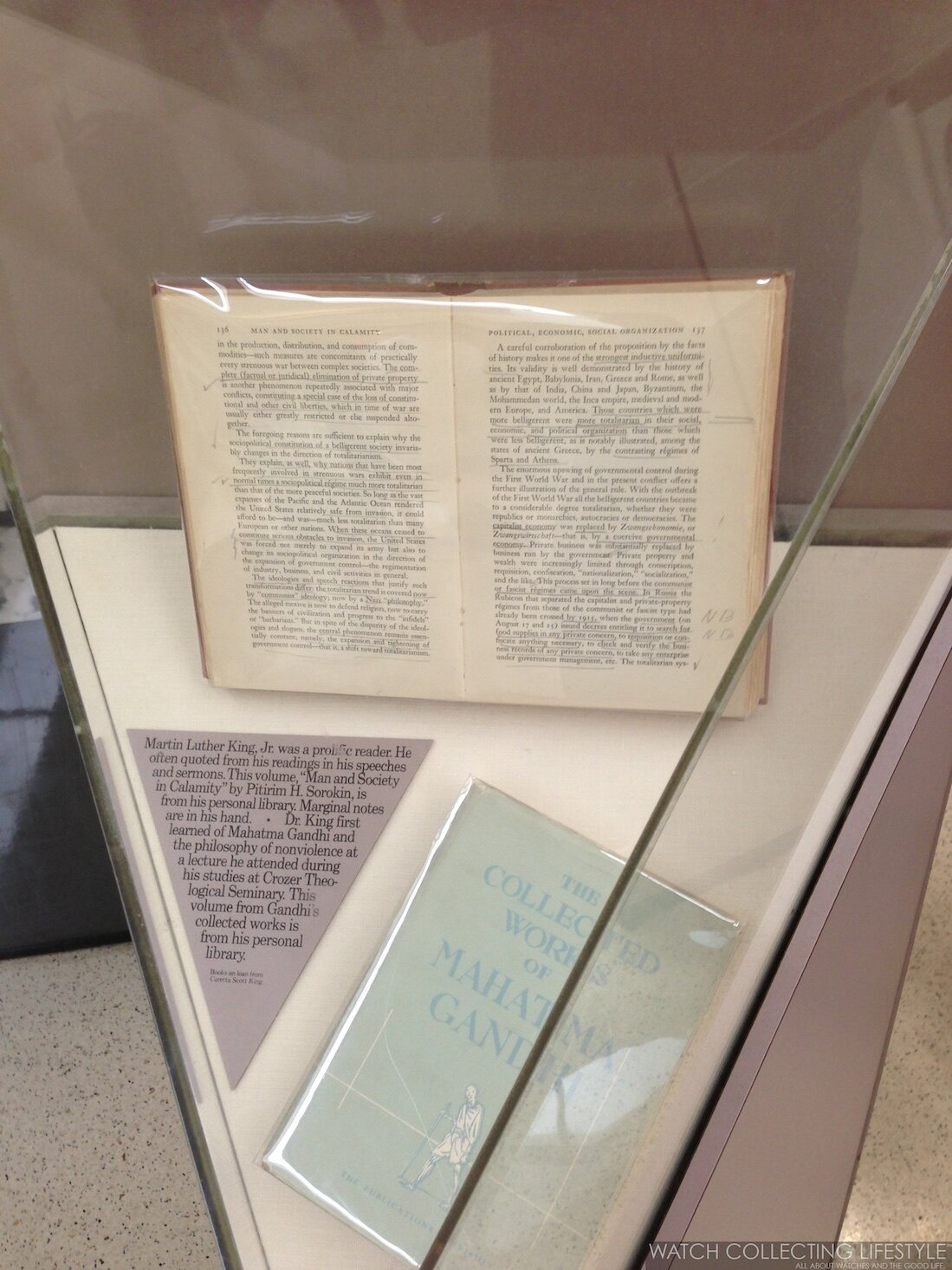I’ll start this feature by first saying that ‘Black Lives Matter’ and I wouldn’t be talking about this watch right now, had it not belonged to the man that did so much for the American Civil Rights Movement. Dr. Martin Luther King Jr. gave his incredible speech “I Have a Dream” almost 57 years ago on August 28th, 1963. On that day, he was probably wearing either this Timex watch —exhibited at the Hartsfield-Jackson Atlanta International Airport— or the Rolex Datejust that we’ve seen in many of his pictures. Below you will find a picture of Dr. King alongside President Lyndon B. Johnson, where we can see him wear that particular Rolex. Back then of course Rolex wasn’t the luxury brand that it is today but a tool Swiss watch made to last forever.
The survivor of attempted murder in 1958 during a book signing, Dr. King received his Ph. D. degree on June 5, 1955, from Boston University. A key player in the Montgomery Bus Boycott after Rosa Parks —the first lady of civil rights— decided not to give up her seat to a white person in the “colored section” of the bus, Dr. King along with Rosa Parks and many others, championed the American Civil Rights Movement until their last breath. And in the same way, as they did, I join the many Americans that today want their voices heard to stop racism in our country. Let’s unite in peace to help break the race barriers and bring equality and justice for all.
Murdered less than five years after that unforgettable speech, Dr. Martin Luther King Jr. was only 39 at the time of his assassination on the evening of April 4, 1968, in Memphis, Tennessee. He was a real social activist and a person that played a key role in the American Civil Rights Movement in the 1950s.
Awarded the Nobel Peace Prize in 1964, he fought for the rights of African Americans, the economically disadvantaged, and all victims of injustice. His voice was heard as that one man that wanted equality for all, regardless of their race or color. Today, I’d like to honor his memory for his many contributions and I really hope that what he started finally comes to fruition in order to eliminate racism once and for all in the United States of America.
Dr. Martin Luther King Jr. During a News Conference, October 1966. (Photo: The Virginian-Pilot)
“Tell Them About the Dream!”
In Dr. King’s 17-minute speech, he departed from his prepared text, possibly at the prompting of Mahalia Jackson —American Gospel singer and civil rights activist—, who shouted behind him: "Tell them about the dream!"
Below those eight sentences that will forever mean hope and the only way to stop racism once and for all in America and the rest of the world.
I say to you today, my friends, so even though we face the difficulties of today and tomorrow, I still have a dream. It is a dream deeply rooted in the American dream.
I have a dream that one day this nation will rise up and live out the true meaning of its creed: 'We hold these truths to be self-evident: that all men are created equal.'
I have a dream that one day on the red hills of Georgia the sons of former slaves and the sons of former slave owners will be able to sit down together at the table of brotherhood.
I have a dream that one day even the state of Mississippi, a state sweltering with the heat of injustice, sweltering with the heat of oppression, will be transformed into an oasis of freedom and justice.
I have a dream that my four little children will one day live in a nation where they will not be judged by the color of their skin but by the content of their character.
I have a dream today.
I have a dream that one day, down in Alabama, with its vicious racists, with its governor having his lips dripping with the words of interposition and nullification; one day right there in Alabama, little black boys and black girls will be able to join hands with little white boys and white girls as sisters and brothers.
I have a dream today.
"I Have a Dream" came to be regarded as one of the finest speeches in the history of American oratory. The March, and especially King's speech, helped put civil rights at the top of the agenda of reformers in the United States and facilitated passage of the Civil Rights Act of 1964. The original typewritten copy of the speech, including King's handwritten notes on it, was discovered in 1984 to be in the hands of George Raveling, the first African-American basketball coach of the University of Iowa. In 1963, Raveling, then 26 years old, was standing near the podium, and immediately after the oration, he impulsively asked King if he could have his copy of the speech. He got it.
The Selma Voting Rights Movement and "Bloody Sunday"
Then on March 7, 1965, acting on James Bevel's call for a march from Selma to Montgomery, Alabama, Dr. King, Bevel, and the SCLC —African-American Civil Rights Southern Christian Leadership Conference— attempted to organize the march to the state's capital. The first attempt was aborted because of police violence against the demonstrators. Known as “Bloody Sunday”, that day even though Dr. King was not present, it was a major turning point in the effort to gain public support for the civil rights movement. It was the clearest demonstration up to that time of the dramatic potential of Dr. King's nonviolence strategy.
On March 9, 1965, Dr. Martin Luther King Jr. led marchers to the Edmund Pettus Bridge in Selma, then held a short prayer session before turning the marchers around and asking them to disperse so as not to violate the court order. The unexpected ending of this second march aroused the surprise and anger of many within the local movement. The march finally went ahead fully on March 25, 1965. At the conclusion of the march on the steps of the state capitol, King delivered a speech that became known as "How Long, Not Long." In it, King stated that equal rights for African Americans could not be far away, "because the arc of the moral universe is long, but it bends toward justice" and "you shall reap what you sow".
Today, it’s been too long for MLK’s dream to come true. Let’s keep fighting to make his dream come true and if you want to support the Black Lives Matter movement click here.
Dr. Martin Luther King Jr. Timex Watch Exhibited at the Hartsfield-Jackson Atlanta International Airport























